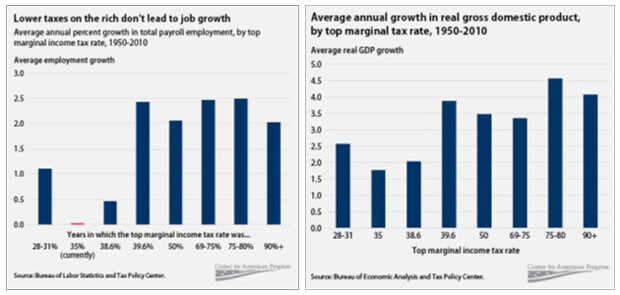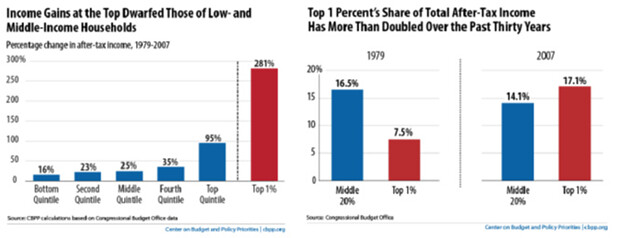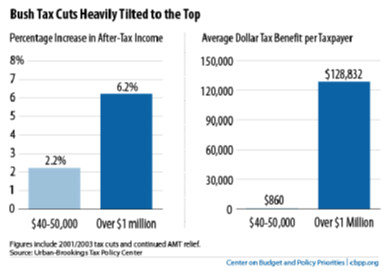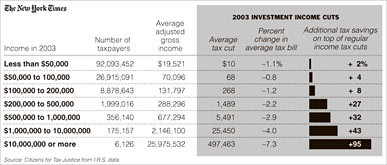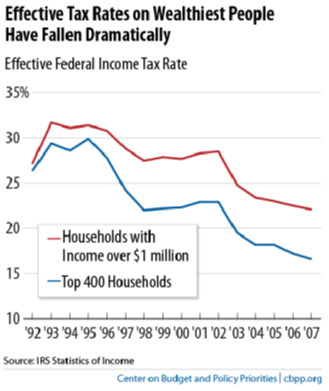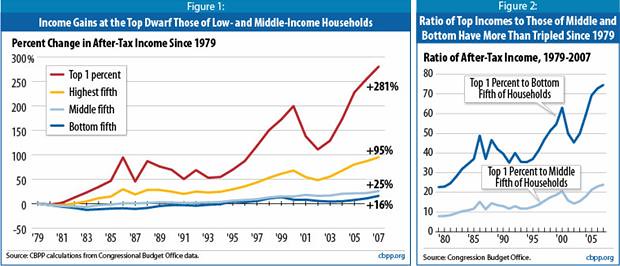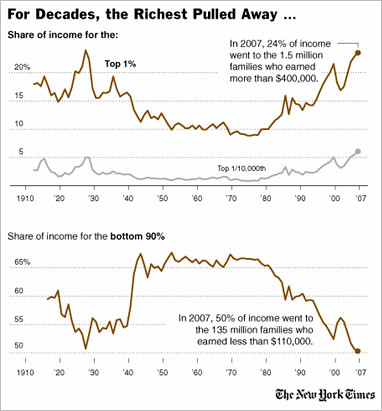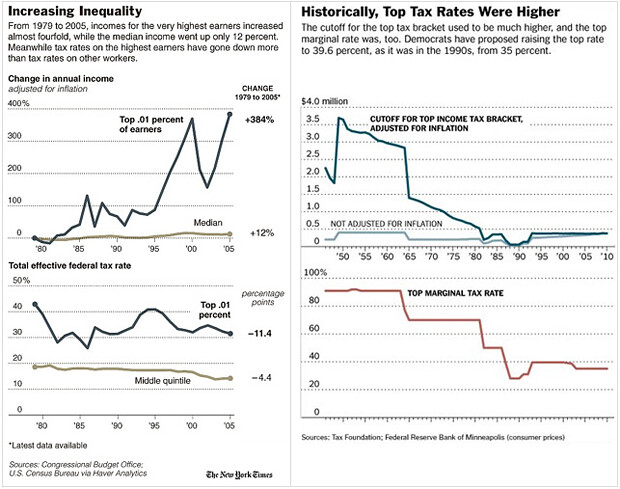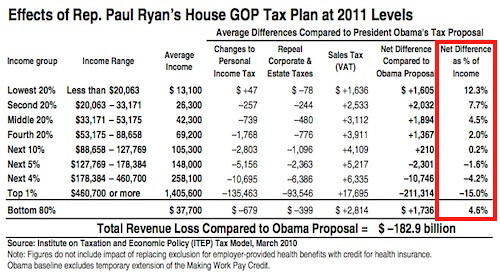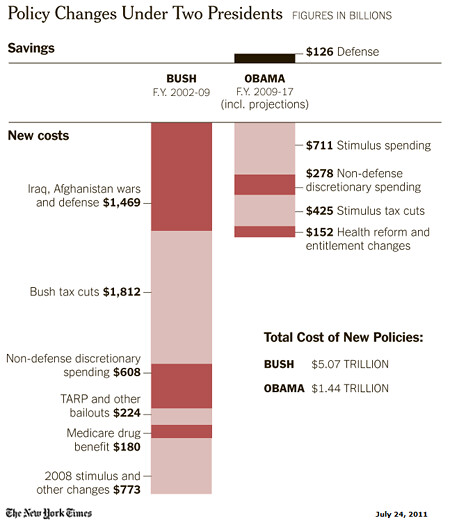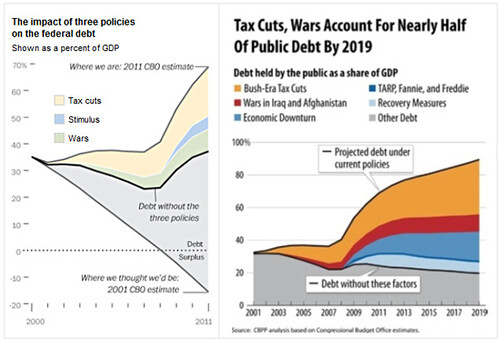Judging from the furious reaction of some of the gilded-class crowd and their Republican protectors, billionaire Warren Buffett struck a nerve with his plea to Congress to "stop coddling the super-rich." Former American Express CEO, Harvey Golub and tea party sugar daddy Charles Koch were quick to protest respectively "the unfair way taxes are collected" and that "my business and non-profit investments are much more beneficial to societal well-being than sending more money to Washington." Meanwhile, House Majority Leader Eric Cantor attacked President Obama's "efforts to incite class warfare."
Of course, a truism of American politics is that the side decrying the class war is the one winning it. And at a time when the federal tax burden is at its lowest in 60 years and income inequality at its highest level in 80, Republicans would still rather wave the unbloodied shirt of class warfare than ask what America's rich and famous can do for their country.
That became abundantly clear during the debt ceiling crisis Republicans manufactured. Weeks before Cantor's Sunday op-ed in the Washington Post accused President Obama of class warfare and a desire to "make it harder to create jobs," his GOP colleagues were already singing from the same hymnal. Senators Dan Coats (R-IN) and Kelly Ayotte (R-NH) quickly called a proposed $4 trillion debt reduction deal 17 percent of which came from new revenues "class warfare." Utah's Orrin Hatch wasn't content to lament "the usual class warfare the Democrats always wage." The poor, Hatch insisted, "need to share some of the responsibility." As for a Senate resolution asking the same of millionaires, Alabama Republican Jeff Sessions said that was "rather pathetic."
Of course, what is really pathetic is the declining tax burden on the small slice of Americans now taking an ever-larger piece of the economic pie.
Even after extorting in December a two-year extension to the upper-income Bush tax cuts and steep reductions in the estate tax impacting only 0.25 percent of families, Republicans refused to countenance a dime of new tax revenue as the debt ceiling debate began. First Eric Cantor and then John Boehner walked out of the debt compromise discussions with President Obama for the same reason. As Boehner put it in his national address in July, "I know those tax increases will destroy jobs."
Back in May, John Boehner explained to CBS News who Republicans would be trying to protect during the debt ceiling negotiations with President Obama:
"The top one percent of wage earners in the United States...pay forty percent of the income taxes...The people he's talking about taxing are the very people that we expect to reinvest in our economy."
If so, those expectations were sadly unmet after the tax cuts of George W. Bush. After all, the last time the top tax rate was 39.6 percent during the Clinton administration, the United States enjoyed rising incomes, 23 million new jobs and budget surpluses. Under Bush? Not so much.
On January 9, 2009, the Republican-friendly Wall Street Journal summed it up with an article titled simply, "Bush on Jobs: the Worst Track Record on Record." (The Journal's interactive table quantifies his staggering failure relative to every post-World War II president.) The meager one million jobs created under President Bush didn't merely pale in comparison to the 23 million produced during Bill Clinton's tenure. In September 2009, the Congressional Joint Economic Committee charted Bush's job creation disaster, the worst since Hoover:
As David Leonhardt of the New York Times aptly concluded last year:
Those tax cuts passed in 2001 amid big promises about what they would do for the economy. What followed? The decade with the slowest average annual growth since World War II. Amazingly, that statement is true even if you forget about the Great Recession and simply look at 2001-7.
The data are clear: lower taxes for America's so called job-creators don't mean either faster economic growth or more jobs for Americans.
But while Boehner's job creators didn't create any jobs after the top rate was trimmed to 35 percent and capital gains and dividends taxes were slashed, they did enjoy an unprecedented windfall courtesy of the United States Treasury.
For Republicans, this predictable result of the Bush tax cuts was a feature, not a bug.
As the Center for American Progress noted in 2004, "for the majority of Americans, the tax cuts meant very little," adding, "By next year, for instance, 88 percent of all Americans will receive $100 or less from the Administration's latest tax cuts."
But that's just the beginning of the story. As the CAP also reported, the Bush tax cuts delivered a third of their total benefits to the wealthiest one percent of Americans. And to be sure, their payday was staggering. The Center on Budget and Policy Priorities showed that millionaires on average pocketed almost $129,000 from the Bush tax cuts of 2001 and 2003. As a result, millionaires saw their after-tax incomes rise by 6.2 percent, while the gain for those earning between $40,000 and $50,000 was paltry 2.2 percent.
And as the New York Times uncovered in 2006, the 2003 Bush dividend and capital gains tax cuts offered almost nothing to taxpayers earning below $100,000 a year. Instead, those windfalls reduced taxes "on incomes of more than $10 million by an average of about $500,000." As the Times explained in a shocking chart: "The top 2 percent of taxpayers, those making more than $200,000, received more than 70 percent of the increased tax savings from those cuts in investment income."
It's no wonder that between 2001 and 2007- a period during which poverty was rising and average household income had fallen - the 400 richest taxpayers saw their incomes double to an average of $345 million even as their effective tax rate was virtually halved.
As ThinkProgress demonstrated, historically lower tax rates for the richest Americans did not produce either more job creation or faster economic growth. (In fact, the Bush years produced what David Leonhardt rightly labeled as "The decade with the slowest average annual growth since World War II.") But what the conservative cornucopia for the gilded-class does reliably produce is unprecedented income inequality.
A report from the Center on Budget and Policy Priorities (CBPP) found a financial Grand Canyon separating the very rich from everyone else. Over the three decades ending in 2007, the top 1 percent's share of the nation's total after-tax household income more than doubled, from 7.5 percent to 17.1 percent. During that time, the share of the middle 60 percent of Americans dropped from 51.1 percent to 43.5 percent; the bottom four-fifths declined from 58 percent to 48 percent. As for the poor, they fell further and further behind, with the lowest quintile's income share sliding to just 4.9 percent. Expressed in dollar terms, the income gap is staggering:
Between 1979 and 2007, average after-tax incomes for the top 1 percent rose by 281 percent after adjusting for inflation -- an increase in income of $973,100 per household -- compared to increases of 25 percent ($11,200 per household) for the middle fifth of households and 16 percent ($2,400 per household) for the bottom fifth.
As the New York Times revealed in August 2009, by 2007 the top 1 percent - the 1.5 million families earning more than $400,000 - reaped 24 percent of the nation's income. The bottom 90% - the 136 million families below $110,000 - accounted for just 50 percent.
If you had any lingering doubts about Warren Buffett's admission that "it's my class, the rich class, that's making war, and we're winning," this pair of charts from the New York Times should put them to rest. As the upper-income tax burden fell, income inequality in the U.S. exploded.
The pathetic irony is that 98 percent of Republicans in Congress voted for the Ryan budget proposal which would make both income inequality and the national debt much worse. Analyses by the Center on Budget and Policy Priorities showed that the Bush tax cuts accounted for half of the deficits during his tenure, and if made permanent, over the next decade would cost the U.S. Treasury more than Iraq, Afghanistan, the recession, TARP and the stimulus - combined. The Ryan budget adds $6 trillion in new debt over the next 10 years (necessitating, of course, that Republicans raise the debt ceiling repeatedly), $4 trillion of which is dedicated to new tax cuts.
And as Matthew Yglesias explained, earlier analyses of similar proposals in Ryan's Roadmap reveal that working Americans would have to pick up the tab left unpaid by upper-income households as the top rate is dropped from 35 percent to 25 percent:
This is an important element of Ryan's original "roadmap" plan that's never gotten the attention it deserves. But according to a Center for Tax Justice analysis (PDF), even though Ryan features large aggregate tax cuts, ninety percent of Americans would actually pay higher taxes under his plan.
In other words, it wasn't just cuts in middle class benefits in order to cut taxes on the rich. It was cuts in middle class benefits and middle class tax hikes in order to cut taxes on the rich. It'll be interesting to see if the House Republicans formally introduce such a plan and if so how many people will vote for it.
We now know the answer: 235 House Republicans and 40 GOP Senators.
On tax day in 2009, former Bush press flunky Ari Fleischer fretted about proposals to raise upper-income tax rates. (The top 10 percent of taxpayers, Fleischer argued, are "supporting virtually everyone and everything" and "their burden keeps getting heavier." As he also put it, "It's also what's called redistribution of income, and it is getting out of hand.") But it was Michele Bachmann who in February 2009 coined the slogan for the Republican class warriors:
"We're running out of rich people in this country."
She need not have worried.
As the Los Angeles Times explained in "Millionaires Make a Comeback", by 2010 the wealthy had more than made up their losses from the Bush Recession. (The middle class has not been so lucky.) Executive pay rose by 23% last year. Since 2009, corporate profits "captured 88 percent of the growth in real national income while aggregate wages and salaries accounted for only slightly more than 1 percent of the growth in real national income." By last summer, the Wall Street Journal proudly proclaimed, "U.S. Economy Is Increasingly Tied to the Rich." As a recent Deloitte presentation for wealth managers forecast (see chart at top):
Our analysis indicates that aggregate wealth of millionaire households in the U.S. in 2020 will likely reach $87 trillion, from $39 trillion in 2011.
That good news was no consolation for Harvey Golub, who now carries the Republicans' water at the American Enterprise Institute. Despite last year's reductions in the estate tax, Golub whined that "it is unfair" that "gifts to charities are deductible but gifts to grandchildren are not." Golub concluded:
"Before you 'ask' for more tax money from me and others, raise the $2.2 trillion you already collect each year more fairly and spend it more wisely. Then you'll need less of my money."
To put it bluntly, that's rich.
Earlier this year, the Washington Post summed up data from the nonpartisan Congressional Budget Office (CBO) to explain the origins of the $14.3 trillion U.S. debt. As the numbers show, history did not, as Republicans pretend, start on January 20, 2009:
The biggest culprit, by far, has been an erosion of tax revenue triggered largely by two recessions and multiple rounds of tax cuts. Together, the economy and the tax bills enacted under former president George W. Bush, and to a lesser extent by President Obama, wiped out $6.3 trillion in anticipated revenue. That's nearly half of the $12.7 trillion swing from projected surpluses to real debt.
Now, the New York Times has examined the tsunami of debt that began sweeping over the United States when George W. Bush ambled into the White House in 2001. As this chart shows, Bush's policies along with the recession he presided over not only washed away the projected surpluses he inherited from Bill Clinton, but were also largely responsible for draining the Treasury for his successor Barack Obama:
With President Obama and Republican leaders calling for cutting the budget by trillions over the next 10 years, it is worth asking how we got here -- from healthy surpluses at the end of the Clinton era, and the promise of future surpluses, to nine straight years of deficits, including the $1.3 trillion shortfall in 2010. The answer is largely the Bush-era tax cuts, war spending in Iraq and Afghanistan, and recessions.
Despite what antigovernment conservatives say, non-defense discretionary spending on areas like foreign aid, education and food safety was not a driving factor in creating the deficits. In fact, such spending, accounting for only 15 percent of the budget, has been basically flat as a share of the economy for decades. Cutting it simply will not fill the deficit hole.
As the Times noted, "the Bush tax cuts have had a huge damaging effect. If all of them expired as scheduled at the end of 2012, future deficits would be cut by about half, to sustainable levels." But for Republicans, this was a feature of the Bush tax cuts and not a bug. After all, in January 2001 Fed Chairman Alan Greenspan blessed the Bush tax cuts because he was worried that the projected surpluses were too large. For the same reason, a young Congressman Paul Ryan fretted that the windfall for the wealthy was "too small" and "not big enough to fit all the policy we want."
Leave aside for the moment that Ronald Reagan tripled the national debt and increased the debt ceiling 17 times. Forget also George W. Bush nearly doubled the debt or that the Bush tax cuts were the biggest driver of debt over the past decade, and if made permanent, would be continue to be so over the next. Pay no attention to the federal tax burden now at its lowest level in 60 years or income inequality at its highest level in 80 years after a decade of plummeting rates for America's supposed job creators who don't create jobs. Ignore for now that Republican majorities voted seven times to raise the debt ceiling under President Bush and the current GOP leadership team voted a combined 19 times to bump the debt limit $4 trillion during his tenure. Look away from the two unfunded wars in Afghanistan and Iraq, the budget-busting Bush tax cuts of 2001 and 2003 and the Medicare prescription drug program because, after all, John Boehner, Eric Cantor and Mitch McConnell voted for all of it.
Utah Senator Orrin Hatch was telling the truth when he described Republican fiscal management during the Bush years by acknowledging, "It was standard practice not to pay for things." But House Minority Leader Eric Cantor was lying when he protested last month:
"What I don't think that the White House understands is how difficult it is for fiscal conservatives to say they're going to vote for a debt ceiling increase."
Not, the record shows, if a Republican is in the White House.
Or if the richest people and most profitable corporations in America are asked to pay one more cent of it.
(This piece also appears at Perrspectives.







